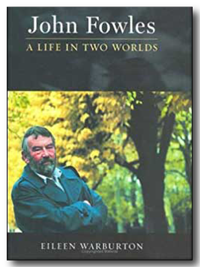Note: James Aubrey is a professor of English at Metropolitan State College of Denver. His 1991 book John Fowles: A Reference Companion contains a biography of Fowles, along with explanatory notes about obscure details and references in all of Fowles’ novels. Aubrey has also edited a collection of essays titled John Fowles and Nature: Fourteen Perspectives on Landscape, and most recently published Filming John Fowles. All three books are available for purchase on our First Editions page.
The following is his review of John Fowles’ book Wormholes, written when it was originally published in 1998.
Readers sometimes wonder what ever happened to John Fowles. His first three novels were best sellers, The French Lieutenant’s Woman at #1 for six months. His later novels were less popular, from Daniel Martin’s Anglo-American social realism to A Maggot’s uncategorizable hybrid of mystery and history that seems to docu-dramatize an abduction by aliens in the eighteenth century. Since 1986, Fowles hasn’t published any fiction.
His new collection of essays, Wormholes, does not constitute a comeback, exactly, but it shows that he can still write remarkably intelligent essays, most of them as quirky as his novels (or his titles). The collection ranges across his career, from some of his most recent work to pieces from the 1960s, from autobiography and occasional writing to philosophical meditations and literary criticism. Together the essays reveal a fascinating mind at work, eccentrically English yet at the same time transatlantic, even global in outlook, and typically engaged with vital issues.
This is a John Fowles that most of his admirers won’t know, although they might have guessed at his green-left politics and feminism from his fiction, and might have expected essays like this from a writer whose best-known novel is as much a commentary on Victorian life as it is a love story. Wormholes is a personal look at twentieth century life by a writer who is curious about everything–and wants others to wonder, too. He thinks hard, and he demands a lot of his audience, who may find daunting his casual assumption that readers know John Clare as well as they know Henry David Thoreau, for example, or that they know Calvados from scrumpy. The essays are never easy but are always intriguing.
And just who is Fowles? He describes himself as a magpie in one piece, which turns into an essay on the unsystematic way he reads. Another essay describes what he was thinking about, even dreaming about when he was writing The French Lieutenant’s Woman, including the way a nearly-forgotten, black, female character from an obscure French novel seems to have emerged from his unconscious as a white woman in a black cloak standing on the Lyme Regis breakwater staring across the English Channel toward France. In “Greece” Fowles vividly recalls the island of Spetses, which became the setting for his novel The Magus. France, too, he says, helped form who he is, partly via Sarte and Camus and French studies at Oxford University.
Fowles declares himself to be “English, not British” in a 1964 essay, and he elaborates on what that means in a discussion of Robin Hood, whose practice of hiding in the woods Fowles sees as quintessentially English behavior, equivalent to hiding one’s feelings from others–the classic English reserve that outsiders cannot penetrate. What he means by British behavior includes flag waving and empire building, a topic he returns to in a withering critique of the 1982 war over the Falkland Islands. American culture, too, comes in for its share of criticism in his pre-feminist critique of Hollywood starlets–and the men besotted with them. It may be in his eclecticism as a critic of culture that Fowles is most like a magpie.
More than one-third of Wormholes is made up of essays on literary figures–not potted biographies or textbook introductions, but intelligent treatments with an attitude. Who but Fowles would seriously argue that medieval poet Marie de France was the first woman novelist? After reading the essay, who would want to deny it? In a piece inspired by a Harvard psychiatrist’s musings about creativity, Fowles speculates about Thomas Hardy’s obsession with a lost love. In another essay, Fowles meditates on his only meeting with William Golding, over lunch, and on the notion of author as celebrity. Or Fowles shows why we read Kafka, writing perversely about how little he can remember of Kafka’s novels. Or Fowles pleads for a revaluation upward of D.H. Lawrence, whose reputation has so declined in the last half of this century. Indeed, Fowles’ literary criticism is sometimes reminiscent of Lawrence’s Studies in Classical American Literature, with its strong readings of work by other writers.
Wormholes could not include all the non-fiction Fowles has written, but one exclusion that surprises me is The Tree, Fowles’ meditation on woods and gardens, writing and walking–perhaps his best work and surely a centerpiece of his thinking. The Tree is long but no longer than Islands, which is included in its entirety. The Tree has much more in common with the other essays grouped as writing about “Nature and the Nature of Nature” than does Shipwrecks. I can only suppose that Fowles and his editor, Jan Relf, decided that The Tree had been often enough re-printed or anthologized that it might be omitted here.
Wormholes reminds us how good a writer Fowles is. Will he write any more fiction? In the last section of the book, he tells Dianne Vipond that he is working on a novel to be set in the Balkans, with a female protagonist. However, he downplayed the prospect of another novel during his recent visit to the U.S. For the time being, Wormholes will have to satisfy most readers, but it should do so–whether they are hopeful or just curious.
|
